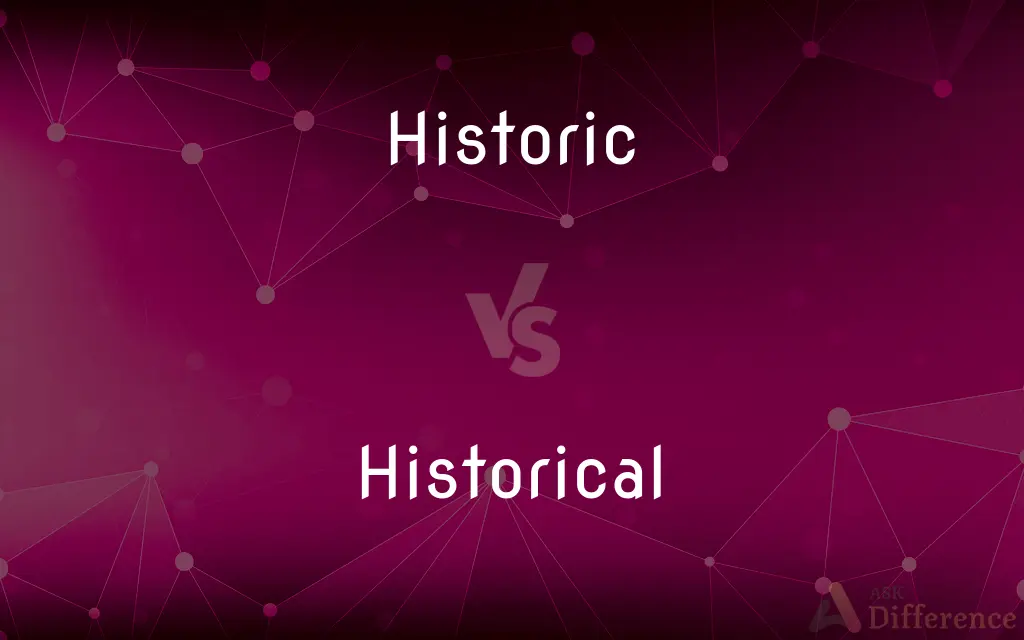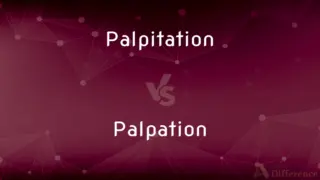Historic vs. Historical — What's the Difference?
By Urooj Arif & Fiza Rafique — Updated on April 4, 2024
Historic refers to something important in history, while historical pertains to anything related to history.

Difference Between Historic and Historical
Table of Contents
ADVERTISEMENT
Key Differences
Historic emphasizes the significance or impact of events, objects, or places in history, underscoring their memorable or monumental status. Historical, on the other hand, broadly encompasses all aspects of history, without necessarily implying importance or distinction.
Historic events or sites are often celebrated or commemorated for their role in shaping the course of history, highlighting moments that have left a lasting legacy or have been pivotal in historical developments. Whereas, historical documentation, research, or artifacts serve as a window into the past, covering a wide range of subjects and eras without the prerequisite of being landmark or transformative.
One key distinction is the inherent value or recognition that historic entities carry; they are marked by their enduring relevance or contribution to historical narratives. Meanwhile, historical elements are characterized by their relation to the past, irrespective of their prominence or influence on subsequent events.
The use of "historic" is generally more selective, reserved for describing events, figures, or sites that have achieved a certain level of acclaim or reverence in history books or collective memory. On the contrary, "historical" is a more inclusive term, applicable to anything derived from or associated with the past, including literature, studies, and findings that contribute to our understanding of history.
Comparison Chart
Definition
Pertaining to events or items of great importance in history.
Related to history or the past, not necessarily important.
ADVERTISEMENT
Context
Often used to describe moments, figures, or places with a significant impact.
Broadly applies to any matter connected to history.
Implication
Implies a level of distinction or significance.
Does not imply importance or distinction.
Use in sentences
Used when emphasizing the importance or impact of historical events.
Used in general references to the past or historical context.
Examples
Historic battles, historic figures.
Historical documents, historical research.
Compare with Definitions
Historic
Having a lasting legacy in historical narratives.
Her historic speech still resonates today.
Historical
Relating to the academic discipline of history.
She pursued a degree in historical studies.
Historic
Relating to something that made a significant impact in history.
The moon landing is considered a historic event.
Historical
Pertaining to the study or representation of past events.
The museum offers a wide array of historical exhibits.
Historic
Of great importance or fame in the past.
The historic treaty ended decades of conflict.
Historical
Connected with history or the past.
The novel is set in a historical period fraught with turmoil.
Historic
Celebrated or recognized for its historical importance.
The city is home to several historic landmarks.
Historical
Serving as a record of the past.
The archives contain valuable historical documents.
Historic
Famous or important in history, or potentially so
The area's numerous historic sites
A historic occasion
Historical
Involving the analysis of historical records.
Historical research provides insights into ancient civilizations.
Historic
(of a tense) used in the narration of past events, especially Latin and Greek imperfect and pluperfect.
Historical
Of or concerning history or past events
Historical evidence
Historic
Having importance in or influence on history.
Historical
Of or relating to history; concerned with past events
A historical account.
Historic
Historical.
Historical
Based on past events or set in the past
A historical novel.
Historic
Very important; noteworthy: having importance or significance in history.
A historic opportunity
July 4, 1776, is a historic date. A great deal of historical research has been done on the events leading up to that day.
The historical works of Lord Macaulay and Edward Gibbon are in and of themselves historic.
Historical
Used in or providing evidence of the past
Historical costumes.
Historical records.
Historic
Old-fashioned, untouched by modernity.
Historical
Concerned with phenomena as they change through time
A historical dictionary.
Historic
Synonym of historical: of, concerning, or in accordance with recorded history or the past generally (See usage notes.)
Historical
Important or famous in history. See Usage Note at historic.
Historic
(grammar) Various grammatical tenses and moods specially used in retelling past events.
The historic tenses include the imperfect, the pluperfect, and the future perfect.
Historical
Of, concerning, or in accordance with recorded history, (particularly) as opposed to legends, myths, and fictions.
July 4, 1776, is a historic date. A great deal of historical research has been done on the events leading up to that day.
The historical works of Lord Macaulay and Edward Gibbon are in and of themselves historic.
Historic
(obsolete) A history, a non-fiction account of the past.
Historical
About history; depicting persons or events from history.
Historic
(obsolete) A historian.
Historical
Of, concerning, or in accordance with the past generally.
Historic
Of or pertaining to history, or the record of past events; as, an historical poem; the historic page.
There warriors frowning in historic brass.
Historical
Set in the past.
Historic
Having once lived, existed, or taken place in the real world; - contrasted with legendary; as, the historical Jesus; doubt that a historical Camelot every existed; actual historical events.
Historical
(uncommon) Former, erstwhile; lapsed, nominal.
Historic
Belonging to the past; as, historical (or historic) times; a historical character.
Historical
(grammar) One of various tenses or moods used to tell about past events, historic (tense).
Historic
Within the period of time recorded in written documents; as, within historic times. Opposite of prehistoric.
Historical
Synonym of hereditaryor evolutionary.
Historic
Same as diachronic.
Historical
Of, concerning, or in accordance with the scholarly discipline of history.
The Royal Historical Society
The State Historical Society of Wisconsin
Historic
Belonging to the past; of what is important or famous in the past;
Historic victories
Historical (or historic) times
A historical character
Historical
Done in the manner of a historian: written as a development over time or in accordance with the historical method.
Historic
Important in history;
The historic first voyage to outer space
Historical
(uncommon) historic: important or likely to be important to history and historians.
Historical
Forming compound adjectives with the meaning "historical/~" or "historically":
Historical
A historical romance.
Historical
Of or relating to the study of history;
Historical scholars
A historical perspective
Historical
Having once lived or existed or taken place in the real world as distinct from being legendary;
The historical Jesus
Doubt that a historical Camelot every existed
Actual historical events
Historical
Belonging to the past; of what is important or famous in the past;
Historic victories
Historical (or historic) times
A historical character
Historical
Used of the study of a phenomenon (especially language) as it changes through time;
Diachronic linguistics
Common Curiosities
What is historical accuracy?
Historical accuracy refers to the extent to which a depiction of the past conforms to historical facts and evidence.
Are all historical events considered historic?
No, not all historical events are considered historic; only those with significant impact or importance are termed historic.
How do historians determine what is historic?
Historians consider the impact, significance, and lasting legacy of events to determine their historic status.
What is the importance of historical context?
Historical context provides the background necessary to understand the circumstances and significance of events or periods.
What makes an event historic?
An event is considered historic if it has a significant impact on history, marking a pivotal or transformative moment.
What role do historical artifacts play?
Historical artifacts provide tangible links to the past, helping to illustrate and understand historical events and cultures.
Can literature be historical?
Yes, literature can be historical if it is set in the past or incorporates historical events and figures.
Can a place be both historic and historical?
Yes, a place can be both historic (of great importance) and historical (related to the past).
Is historic always positive?
While historic often implies a positive impact, it can also refer to events that are notorious or have negative connotations.
What distinguishes historical fiction?
Historical fiction incorporates historical events or settings, blending factual and fictional elements.
Can a recent event be considered historic?
Yes, a recent event can be considered historic if it is deemed to have a significant impact on the course or understanding of history.
How does something become recognized as historic?
Recognition as historic usually comes through scholarly consensus, public acknowledgment, or legal designation.
Are historical documents always reliable?
While historical documents are valuable sources, they must be critically assessed for bias, perspective, and context.
Why study historical events?
Studying historical events helps us understand the past, learn from it, and recognize patterns that might inform the future.
What is a historical narrative?
A historical narrative is a story or account of events in the past, often constructed from evidence and research.
Share Your Discovery

Previous Comparison
Palpitation vs. Palpation
Next Comparison
Menagerie vs. ZooAuthor Spotlight
Written by
Urooj ArifUrooj is a skilled content writer at Ask Difference, known for her exceptional ability to simplify complex topics into engaging and informative content. With a passion for research and a flair for clear, concise writing, she consistently delivers articles that resonate with our diverse audience.
Co-written by
Fiza RafiqueFiza Rafique is a skilled content writer at AskDifference.com, where she meticulously refines and enhances written pieces. Drawing from her vast editorial expertise, Fiza ensures clarity, accuracy, and precision in every article. Passionate about language, she continually seeks to elevate the quality of content for readers worldwide.















































